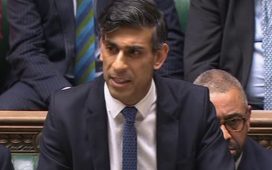The government is set to unveil a £10m campaign to tackle the obesity crisis as experts warn that it is “the single most important modifiable risk factor” in fighting Covid-19.
The drive to get the nation fitter and eating more healthily is an effort to reverse bad dietary habits that the government fear many people have lapsed into during the lockdown, following expert analysis that the risks of hospitalisation, intensive care treatment and death all increase when patients are overweight.
The campaign, called Better Health, will have a particular focus on people of black, Asian and minority ethnic backgrounds, who have suffered disproportionately high death rates during the pandemic, the Guardian understands. It will include advertisements on TV and radio, on billboards, online and in traditional print media.
“It’ll be an upbeat, energising campaign that will show very diverse people getting on top of fighting the fat. It will tap into the zeitgeist of people’s desire to reset their relationship with their diet and exercise regimes after four months of lockdown, which have seen some people get fitter but a lot more people eat more than usual while they’ve been at home,” said one official.
Under plans being unveiled on Monday, bottles and cans of wine, beer and other alcohol products would have to carry labels telling consumers how many calories are in them.
Boris Johnson will help launch the plan in which he has taken a close personal interest following his spell in intensive care in April with Covid-19. The prime minister is believed to have become convinced that his weight – he was 17 and a half stone before the pandemic struck in March – was part of the reason why he became so unwell and needed care in St Thomas’ hospital in central London, which he said had saved his life.
Johnson on Friday urged Britons to slim down this summer in order to reduce their risk of dying from Covid-19, before what many doctors fear will be a second wave of the disease later this year.
Speaking at a GP surgery in east London, he disclosed that he had lost a stone in weight since his time in intensive care. Downing Street aides have stressed how his brush with death and realisation of the close link between obesity and Covid-19 have made him determined to address obesity.
He said that he would “encourage” people to shed weight in the next few months.
Reversing his previous opposition to what critics portray as nanny state intervention in personal health behaviour, Johnson added: “I’m not normally a believer in nannying, or bossing type of politics. But the reality is that obesity is one of the real co-morbidity factors.
“Losing weight is, frankly, one of the ways that you can reduce your own risks from Covid.”
Public Health England today published a report into the impact of obesity on people with Covid-19 and said the case for action has “never been stronger”. The health agency’s review of evidence relating to weight and the effects of the virus, published on Saturday, found that the risks of hospitalisation, intensive care treatment and death all “seem to increase progressively with increasing BMI (body mass index) above the healthy weight range”.
Prof Susan Jebb, professor of diet and population health at the University of Oxford, and a peer-reviewer of the PHE report, said it highlighted the need to tackle “the single most important modifiable risk factor” for Covid-19.
Doctors and health campaigners welcomed reports that the plan will ban advertisements for junk food on TV before the 9pm watershed, online advertising of products high in sugar, fat or salt, and in-store promotions of such foodstuffs, such as buy one get one free offers. “We have epidemic levels of obesity in the UK and we are storing up huge problems for children and young people unless we turn things around,” said Prof Russell Viner, the president of the Royal College of Paediatrics and Child Health.
In a later interview with the BBC, Johnson linked his own experience with Covid-19 to what he called “our national struggle with obesity”.
He said: “Typically our great country tends to be a little bit fatter than many other countries in Europe. So you asked about my own personal circumstances, and one of the lessons I drew from that is the need for us all to be fitter and healthier. And if we’re fitter and healthier by the way, we will also be happier.
“And – and here’s the key thing, if we’re fitter and healthier, and if we lose weight, we’ll be better able not just to individually withstand coronavirus, but we’ll do a great deal to protect the NHS. And that’s why we’ll be bringing forward an obesity strategy.”
As part of the plan family doctors will be told to advise dangerously overweight patients to improve their health by taking more exercise rather than just taking drugs or undergoing weight loss surgery.
GPs will also be asked to recommend that patients who are keen to shed some pounds get involved in more social activities, in an expansion of the NHS’s policy of using “social prescribing” rather than conventional medicine to treat depression, loneliness and other mental health conditions. And they will also advise people to use NHS-approved diet management apps and start working with new “healthy weight coaches” that will be provided by GP surgeries.
However, initiatives that were due to feature in the plan, for example, GPs referring more patients to weight loss schemes such as WW, formerly known as Weight Watchers, have been dropped. GPs made it clear that they did not feel comfortable talking to patients about something as personal as their weight.
“The idea of using weight management programmes [more] is sensitive because GPs don’t like telling people that they are fat,” said one official involved in drawing up the strategy.
The government will consult on a plan to compel manufacturers of alcoholic products to clearly state on them how many calories they contain, whether they are sold in pubs, restaurants, supermarkets or off-licences.













